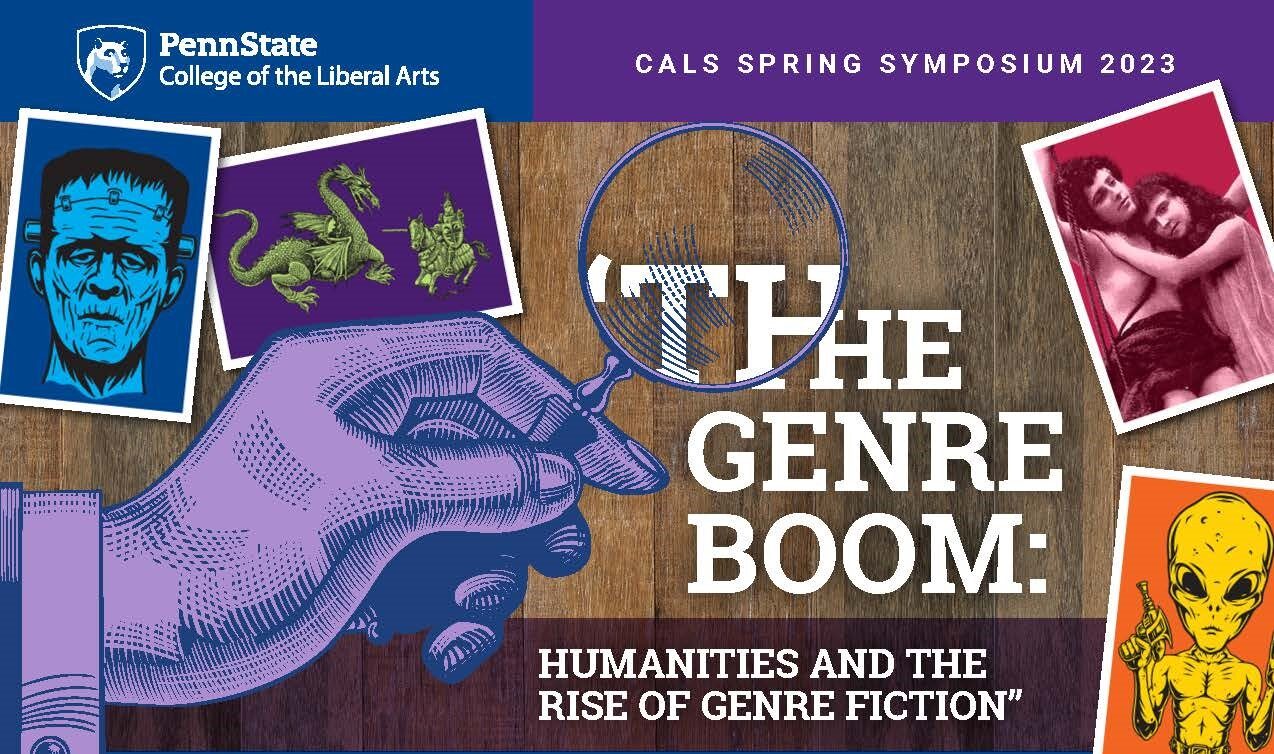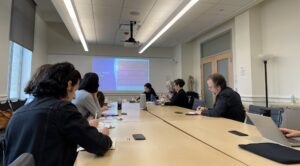CALS Spring Symposium Returns with a Bang—or, Rather, a Boom

After a three-year hiatus, the CALS Spring Symposium returned on March 24 with “The Genre Boom: Humanities and the Rise of Genre Fiction.” This year’s event, which comprised a 90-minute panel discussion featuring speakers from Penn State and other institutions, was slightly scaled-down from the usual daylong format but still attracted a number of faculty and students to the Burrowes Building’s Grucci Room.
Christian Haines, interim CALS director and coordinator of this year’s event, said the Symposium topic was conceived in response to literary studies’ “belated recognition” of literature’s relationship to “genre systems.” Genre fiction hasn’t always garnered serious academic attention. However, the recent spate of media incorporating tropes of horror, sci-fi, fantasy, romance, crime, and other popular genres presents an opportunity for the discipline to reconsider its approach to genre studies.
The Symposium panelists represented a diversity of subfields in literary and cultural studies. Panelists included Alexis Lothian (Associate Professor of Women, Gender, and Sexuality Studies, University of Maryland), Rebekah Sheldon (Associate Professor of English and Director of Cultural Studies, Indiana University), Jennifer Wagner-Lawlor (Professor of Women’s, Gender, and Sexuality Studies, Penn State), and Haines (Associate Professor of English, Penn State). The panel was moderated by Su Young Lee, a graduate student in English and Women’s, Gender, and Sexuality Studies at Penn State whose research focuses on Asian diasporic literatures and speculative fiction.
Lothian kicked off the event with a presentation on “Fantasy, Fandom, and the Pleasures of Genre.” Based on a book project Lothian is currently working on with her colleague Kristina Busse, the presentation considered the history of “slash” (same-sex couple) fanfiction and its modern-day potential for what Lothian called “feminist and queer world-building.”

As fanfiction has become more realist and diverse in its representations of queer sexuality and racial politics, it has also become more directly conversant with real-world social justice movements. Still, Lothian cautioned, much fanfiction remains conservative in the world it represents. “Pleasure can easily become part of the machinery of oppression,” concluded Lothian. The critical question for readers and scholars of slash fanfiction, said Lothian, is “How do we reckon with fantasy structured by an unjust world?”
Sheldon’s presentation also considered the relationship of genre fiction to contemporary reality. She described the so-called “megatext” in science fiction, a catalog of narrative conventions common to all works of sci-fi. Using the megatext—a “subconsciously hermeneutic enterprise”—as her framework, Sheldon argued that “genre fiction is a system itself and a form of systems thinking” that lends itself to careful critical analysis.
Sheldon noted the tendency of people, and particularly news outlets, to engage in what she called “proleptic speculation.” Proleptic speculation, explained Sheldon, refers to our habit of speaking about a speculated future as if it has already happened. For example, the narrative that “Roe vs. Wade is dead” after the death of Supreme Court Justice Ruth Bader Ginsberg in 2020 was accepted as a foregone conclusion well before the Supreme Court’s reversal of Roe in 2022. Such proleptic speculation is a “collapse of future into present” that can prevent political action under the premise that an outcome has already been decided.
Wagner-Lawlor discussed the dystopic outcome of proleptic speculation in her own presentation, “Genre Boom (or Bust): Queering Reproductive Futurism.” Considering the legacy of Margaret Atwood’s 1985 novel The Handmaid’s Tale, Wagner-Lawlor argued that subsequent novels marketed as “updates” of Atwood’s story also represent an evolution in thinking about queer bodies and utopia.
Riffing on the Symposium title, Wagner-Lawlor concluded that a genre “bust” is one in which all works of the same genre replicate the originary (or most notable) work in that genre; thus, novels that adhere to the plot and politics of The Handmaid’s Tale are a “bust” because they offer nothing new. On the contrary, a genre “boom” occurs when novels of the same genre remix earlier works in that genre—generating not similarity, but difference.
Haines’s presentation, “Genre in the Warehouse,” was also attuned to what constitutes a genre boom. Haines discussed the so-called “logistic revolution,” exemplified by mega-corporations like Amazon that have reimagined the warehouse not only as a site of labor, but as the sum of human existence. Using Rob Hart’s recent novel The Warehouse as his example, Haines argued that “relentless and generic are the twin terms of the warehouse floor.” The monotonous experience of life and labor in the warehouse is formally replicated by Hart in “relentless prose descriptions” listing various activities or objects that make up the protagonist’s daily life.

Haines noted the “generic plot” of Hart’s novel, which combines tropes of dystopian sci-fi and spy fiction, but also called it a work of “experimental fiction.” The seeming disjunction between the generic and the experimental is, to Haines, a reminder that the proliferation of genres and subgenres itself is directly linked to the rise of Amazon and the warehouse. The category of “the literary,” concluded Haines, disavows both the warehouse and the generic-ness that it represents.
Literary critics, said Haines, are usually more invested in the “singularity” of a given text, its quality as “something special.” As this year’s Symposium demonstrated, there is no singular way of understanding genre fiction or the genre boom—but there is doubtless something special, and meaningful, in pursing questions of genre in literary and cultural studies.

After a three-year hiatus, the CALS Spring Symposium returned on March 24 with “The Genre Boom: Humanities and the Rise of Genre Fiction.” This year’s event, which comprised a 90-minute panel discussion featuring speakers from Penn State and other institutions, was slightly scaled-down from the usual daylong format but still attracted a number of faculty and students to the Burrowes Building’s Grucci Room.
Christian Haines, interim CALS director and coordinator of this year’s event, said the Symposium topic was conceived in response to literary studies’ “belated recognition” of literature’s relationship to “genre systems.” Genre fiction hasn’t always garnered serious academic attention. However, the recent spate of media incorporating tropes of horror, sci-fi, fantasy, romance, crime, and other popular genres presents an opportunity for the discipline to reconsider its approach to genre studies.
The Symposium panelists represented a diversity of subfields in literary and cultural studies. Panelists included Alexis Lothian (Associate Professor of Women, Gender, and Sexuality Studies, University of Maryland), Rebekah Sheldon (Associate Professor of English and Director of Cultural Studies, Indiana University), Jennifer Wagner-Lawlor (Professor of Women’s, Gender, and Sexuality Studies, Penn State), and Haines (Associate Professor of English, Penn State). The panel was moderated by Su Young Lee, a graduate student in English and Women’s, Gender, and Sexuality Studies at Penn State whose research focuses on Asian diasporic literatures and speculative fiction.
Lothian kicked off the event with a presentation on “Fantasy, Fandom, and the Pleasures of Genre.” Based on a book project Lothian is currently working on with her colleague Kristina Busse, the presentation considered the history of “slash” (same-sex couple) fanfiction and its modern-day potential for what Lothian called “feminist and queer world-building.”

As fanfiction has become more realist and diverse in its representations of queer sexuality and racial politics, it has also become more directly conversant with real-world social justice movements. Still, Lothian cautioned, much fanfiction remains conservative in the world it represents. “Pleasure can easily become part of the machinery of oppression,” concluded Lothian. The critical question for readers and scholars of slash fanfiction, said Lothian, is “How do we reckon with fantasy structured by an unjust world?”
Sheldon’s presentation also considered the relationship of genre fiction to contemporary reality. She described the so-called “megatext” in science fiction, a catalog of narrative conventions common to all works of sci-fi. Using the megatext—a “subconsciously hermeneutic enterprise”—as her framework, Sheldon argued that “genre fiction is a system itself and a form of systems thinking” that lends itself to careful critical analysis.
Sheldon noted the tendency of people, and particularly news outlets, to engage in what she called “proleptic speculation.” Proleptic speculation, explained Sheldon, refers to our habit of speaking about a speculated future as if it has already happened. For example, the narrative that “Roe vs. Wade is dead” after the death of Supreme Court Justice Ruth Bader Ginsberg in 2020 was accepted as a foregone conclusion well before the Supreme Court’s reversal of Roe in 2022. Such proleptic speculation is a “collapse of future into present” that can prevent political action under the premise that an outcome has already been decided.
Wagner-Lawlor discussed the dystopic outcome of proleptic speculation in her own presentation, “Genre Boom (or Bust): Queering Reproductive Futurism.” Considering the legacy of Margaret Atwood’s 1985 novel The Handmaid’s Tale, Wagner-Lawlor argued that subsequent novels marketed as “updates” of Atwood’s story also represent an evolution in thinking about queer bodies and utopia.
Riffing on the Symposium title, Wagner-Lawlor concluded that a genre “bust” is one in which all works of the same genre replicate the originary (or most notable) work in that genre; thus, novels that adhere to the plot and politics of The Handmaid’s Tale are a “bust” because they offer nothing new. On the contrary, a genre “boom” occurs when novels of the same genre remix earlier works in that genre—generating not similarity, but difference.
Haines’s presentation, “Genre in the Warehouse,” was also attuned to what constitutes a genre boom. Haines discussed the so-called “logistic revolution,” exemplified by mega-corporations like Amazon that have reimagined the warehouse not only as a site of labor, but as the sum of human existence. Using Rob Hart’s recent novel The Warehouse as his example, Haines argued that “relentless and generic are the twin terms of the warehouse floor.” The monotonous experience of life and labor in the warehouse is formally replicated by Hart in “relentless prose descriptions” listing various activities or objects that make up the protagonist’s daily life.

Haines noted the “generic plot” of Hart’s novel, which combines tropes of dystopian sci-fi and spy fiction, but also called it a work of “experimental fiction.” The seeming disjunction between the generic and the experimental is, to Haines, a reminder that the proliferation of genres and subgenres itself is directly linked to the rise of Amazon and the warehouse. The category of “the literary,” concluded Haines, disavows both the warehouse and the generic-ness that it represents.
Literary critics, said Haines, are usually more invested in the “singularity” of a given text, its quality as “something special.” As this year’s Symposium demonstrated, there is no singular way of understanding genre fiction or the genre boom—but there is doubtless something special, and meaningful, in pursing questions of genre in literary and cultural studies.